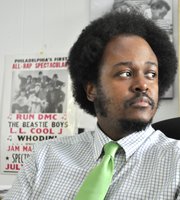Every January, for several years during the mid- to late-1980s, my mother and I would bundle ourselves up for the annual Dr. Martin Luther King Jr. Day March through downtown St. Louis. What I imagine were thousands of us wore T-shirts and ball caps bearing likenesses of our heroes like Dr. King and Malcolm X. We adorned our hats and jackets with buttons featuring famous quotations from the civil-rights legends.
We sang "We Shall Overcome" and "Kumbaya." We chanted slogans from the movement that defined the day:
"End Apartheid!"
"Divest now!"
Back then, I had only a vague idea of what either of those concepts meant except that they had to do with South Africa. Thanks in small part to the divestment movement and some Westerners' decision to boycott corporations doing business with the white-supremacist government of South Africa, apartheid did at last end. Then, in 1994, the majority-black nation elected Nelson Mandela its first black president.
Eventually, mom and I stopped attending the MLK marches. I got older, became a teenager, interested in teenage things. I got into teenage mischief, like the rest of my adolescent peers.
I like to tell myself that I wasn't on a trajectory to become a hardened criminal. But who knows? In the hands of a zealous business owner or prosecutor looking to make example of a young punk, I could have easily wound up in front of a youth-court judge.
Would it matter if all kids have (insert the name of any youthful indiscretion we've all been guilty of)? Probably not. And if it came to that, rest assured that some middle-aged person would shake his or her head in shame and wonder where my parents were, as if I didn't have the good sense to do dirt outside of the view of my mother and father. If Facebook were around back then, there might even be a meme of my shameful mug next to Dr. King or Mandela's photo. "Is this what they fought for?," Internet posts would say.
It didn't come to that. I never wound up in the back of a police squad car, never got a criminal record—it should be noted that I was also fortunate to have parents with the resources to keep me out of any kind of serious trouble—and I went on to graduate from college. Today, I have a career doing what I love for a living. Only through providence and dumb luck was this possible—not because I was smarter, a harder worker or came from a better family than anybody else.
Quardious Thomas (see this week's cover story, "Killing Quardious Thomas," starting on page 16) wasn't so lucky. He did get caught—once by the police for burglarizing a home last year and again on July 12 for breaking into a truck.
Based on my conversations with people who were close to him, he was bright, gregarious, and had a loving, strong family network of relatives and close friends. After his arrest, Thomas seemed to be getting his life back on track. He finished his high-school equivalency and would have started college this fall had he not been shot and killed this summer by a homeowner for allegedly breaking into cars.
So much for second chances. Thanks in part to the many second chances I received, I had the opportunity to travel through southern and eastern Africa a few years ago. I spent part of the trip in Soweto, the famous township near Johannesburg that is a symbol of South Africa's hope and its hopelessness, its poverty and its prosperity.
Being there, I felt the same thing I feel driving along U.S. 49, near where the Emmett Till murder episode played out, or when I visit Montgomery, Ala., one of the cradles of the Civil Rights Movement—the inescapable power of history and place.
In Johannesburg, I walked the same streets as Hector Pieterson, the boy who became the first casualty of the 1976 Soweto Uprising, when students protested the government's plan to force them to learn in Afrikaans, the language of their white oppressors. Archbishop Desmond Tutu, a Nobel laureate, lives near the bed-and-breakfast where I stayed.
Naturally, I visited the home on Vilikazi Street where Nelson Mandela lived before he went to prison on Robben Island for conspiring to sabotage the national power grid. Now a museum, the matchbox house bears bullet holes and Molotov cocktail scorches, scars from the struggle against tyranny. One of the rooms contains glass showcases displaying a pair of Mandela's boots and a belt American championship boxer Sugar Ray Leonard gave him. The kitchen contains coal stove and a metallic dustbin cover, which legend has it Mandela used to shield himself from bullets. In one of the bedrooms, a bed is covered with a blanket made from Jackal pelts.
Even freedom fighters need warmth. We prefer to wrap ourselves in the whitewashed version of Mandela as a gentle, as peaceful leader who told his fellow countrymen to turn the other cheek, to embrace reconciliation. Let us not forget that as a young man, Mandela's government believed him to be a very dangerous criminal. (President Ronald Reagan even had Mandela's African National Congress designated a terrorist organization.)
As far as I can tell, Quardious Thomas was no freedom fighter, but unlike Mandela, who died last week at the age of 95, or myself, Thomas doesn't get the rest of his life to become a different man than he was at age 20.
Rest in peace, Madiba.
Rest in peace, Quardious.


